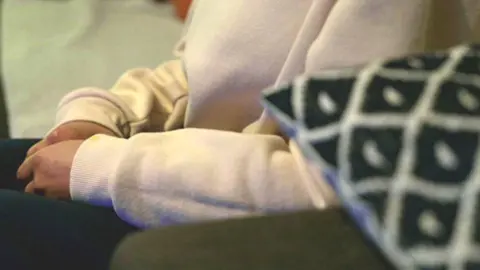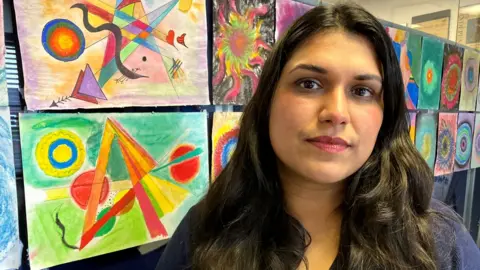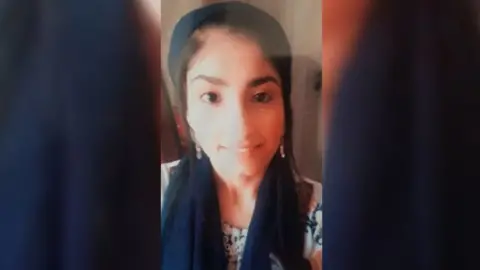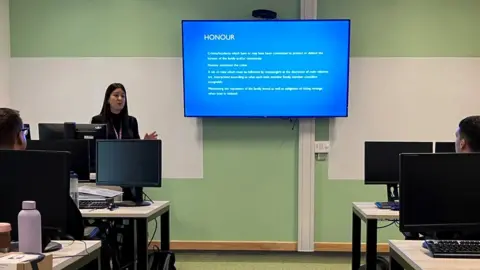Victim speaks of 'living hell' of forced marriage
 BBC
BBCAiyesha was just 17 years old when her parents took her from the UK to Pakistan and, as she puts it, her world became "a living hell".
Her mother and father had told her they were flying out for a family holiday, but that was a lie.
Instead, they had arranged for her to marry her older cousin.
Aiyesha - not her real name - would spend the next four months trapped in rural Pakistan, where her new husband repeatedly raped and beat her.
"It was forceful from his side, really forceful," she told the BBC.
"He'd get into my face and say stuff… 'This is it. You're going to be my wife forever and there's nothing you can do about it'."
Before her forced marriage, Aiyesha had been a self-described "tomboy" in north west England, focused on enjoying time with her friends and planning to travel the world - things which could not be further from what lay ahead of her in Pakistan.
She had enjoyed a relatively normal childhood in a seemingly loving family who, Aiyesha said, were not particularly religious, but were "mindful" of their culture.
However, when she turned 15, tensions began to emerge.
'Fearing for my life'
Aiyesha had dreamed of studying at college and university, but she said her parents disapproved and instead wanted her to, as she described it, "follow the chosen path of marriage".
Two years later, she would find herself draped in gold and beautiful dresses more than 3,000 miles from home, pleading with her mother not to force her to marry.
After her marriage, Aiyesha was initially unable to return home to the UK after her family confiscated her passport and threatened to destroy it.
"I became a different person. I was really vulnerable, fearful and fearing for my life," she said.
On the advice of another cousin, who was someone she trusted, she convinced her family she was happy and five months later she was allowed to fly back to the UK to earn money to bring her husband over.
After returning home, she spent months in limbo before deciding to act - knowing it was only a matter of time before her younger sister would also be forced to marry.

It was at that point that Aiyesha contacted the Women's Aid charity for help and left the family home with her sister, never to return.
"We needed to leave," she said.
"My parents knew about everything that happened to me in Pakistan - and they were a part of it.
"Things weren't getting better and I made the decision one night: let's gather our things and leave."
It was only after the siblings had fled that they found out that a flight had already been booked for Aiyesha's younger sister to be flown to Pakistan to be married.
Aiyesha said she would never forgive her parents for what they had put her through.
"What they did and the word 'forgive' shouldn't even be in the same sentence," she told the BBC.

What is forced marriage?
A forced marriage is illegal in England and Wales. It includes:
- arranging a marriage for someone under the age of 18
- arranging a marriage for someone who lacks the mental capacity
- taking someone overseas to force them to marry, whether the wedding takes place or not
Forcing someone to marry can result in a sentence of up to seven years in prison.

Almost 3,000 honour-based abuse offences, which include forced marriage, were recorded across England and Wales in 2022-23, according to the most recent Home Office data - a 43% increase in four years.
About 260 of those offences happened in Yorkshire.
Karma Nirvana, a Leeds-based national charity which has been supporting victims of honour-based abuse for 30 years, told the BBC its staff were concerned that warning signs were being missed, including by professionals.
One year on from it becoming illegal for under-18s to get married, the charity said it had been approached by social workers, teachers and even police officers who were unaware of the law change in February 2023.
'Postcode lottery'
Natasha Rattu, the charity's director, said: "If your duty is to act on information to safeguard and protect vulnerable children but you don't know the law has come in, that's really problematic."
Police forces' handling of honour-based abuse was a "postcode lottery", with responses to it varying drastically across the country, Ms Rattu said.
"We know there are some forces that we will call, like South Yorkshire, [where] we are more or less guaranteed to get a really positive response.
"Then, there are other forces the helpline almost has a sense of dread ringing, because they know they are not going to get the same response."
Ms Rattu said that one case which Karma Nirvana handled involved a 14-year-old girl who had failed to return back to the UK after raising concerns about her family forcing her into marriage.
In another, a girl's parents were trying to find her a husband, with little acknowledgment from the council that it was illegal and a safeguarding "red flag".
 West Yorkshire Police
West Yorkshire PoliceWomen and girls who reject a forced marriage can be at serious risk - even of death.
Bradford woman Somaiya Begum was murdered by her uncle in July 2022 after she refused an arranged marriage with a cousin in Pakistan.
The 20-year-old was the subject of a forced marriage protection order at the time of her death, due to attempts by her father to force her to marry a cousin "by threat of violence".
Karma Nirvana has warned such orders can "increase the risk" for victims if they are not accompanied by proper protections.
'Big ask'
Suzanne Jackson, who leads South Yorkshire Police's honour-based abuse team, said emergency workers often had only "one chance to get this right".
Ms Jackson provides training across the county to prevent potential victims coming to serious harm if and when they get in touch with the police and come into contact with officers.
"It's a big ask for a victim to come to the police or sign a report," she said.
"They are reporting their families. That is really difficult and the risk they take of being shamed, isolated or it could be the cause of their death."

Ms Jackson said the South Yorkshire force worked closely with Karma Nirvana to help support victims, including those who were not going through criminal proceedings.
"Not everyone wants to prosecute, or wants a forced marriage protection order, or needs that - but they do need support and advice", she said.
She added that the abuse she had seen affected several communities - including some male victims as well as women - and should not be considered an issue just within Muslim communities.
Meanwhile, Aiyesha said that while she and her sister were now safe and had rebuilt their lives, she wanted to encourage other women and girls who might have experienced honour-based abuse to speak out.
"There is help there. A lot of girls won't speak up, because it's a burden knowing the family respect and honour falls on your shoulders...but you can stop it."

Follow BBC Yorkshire on Facebook, X (formerly Twitter) and Instagram. Send your story ideas to [email protected].
